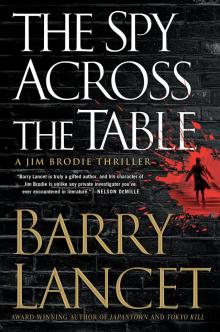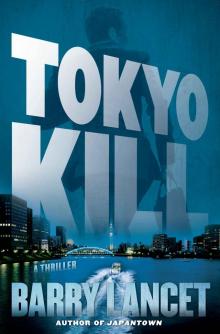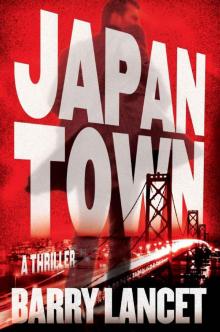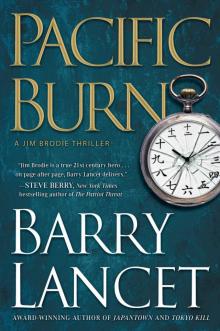- Home
- Barry Lancet
Pacific Burn
Pacific Burn Read online
Thank you for downloading this Simon & Schuster eBook.
* * *
Join our mailing list and get updates on new releases, deals, bonus content and other great books from Simon & Schuster.
CLICK HERE TO SIGN UP
or visit us online to sign up at
eBookNews.SimonandSchuster.com
Simon & Schuster
1230 Avenue of the Americas
New York, NY 10020
www.SimonandSchuster.com
This book is a work of fiction.
Any references to historical events, real people, real organizations, or real places are used fictitiously.
Other names, characters, places, and events are products of the author’s imagination, and any resemblance to actual events or places or persons, living or dead, is entirely coincidental.
Copyright © 2016 by Top Line Creative, LLC
All rights reserved, including the right to reproduce this book or portions thereof in any form whatsoever.
For information address Simon & Schuster Subsidiary Rights Department, 1230 Avenue of the Americas, New York, NY 10020.
First Simon & Schuster hardcover edition February 2016
SIMON & SCHUSTER and colophon are registered trademarks of Simon & Schuster, Inc.
For information about special discounts for bulk purchases, please contact
Simon & Schuster Special Sales at 1-866-506-1949 or [email protected].
The Simon & Schuster Speakers Bureau can bring authors to your live event.
For more information or to book an event contact the Simon & Schuster Speakers Bureau at 1-866-248-3049 or visit our website at www.simonspeakers.com.
Library of Congress Cataloging-in-Publication Data
Lancet, Barry.
Pacific burn : a thriller / Barry Lancet.—First Simon & Schuster hardcover edition.
pages; cm
1. Antique dealers—California—San Francisco—Fiction. 2. Japanese—California—San Francisco—Fiction. 3. Murder—Investigation—Fiction. 4. Tokyo (Japan)—Fiction. I. Title.
PS3612.A547486P33 2016
813'.6—dc23 2015015933
ISBN 978-1-4767-9488-4
ISBN 978-1-4767-9490-7 (ebook)
Contents
Epigraph
Day 1: Deathwatch
Chapter 1
Chapter 2
Chapter 3
Chapter 4
Chapter 5
Chapter 6
Chapter 7
Chapter 8
Chapter 9
One Week Later: First Shot
Chapter 10
Chapter 11
Chapter 12
Chapter 13
Chapter 14
Chapter 15
Day 3 - Tuesday: Deeper Waters
Chapter 16
Chapter 17
Chapter 18
Chapter 19
Chapter 20
Days 4 & 5 - Wednesday & Thursday: Kill Order
Chapter 21
Chapter 22
Chapter 23
Chapter 24
Chapter 25
Chapter 26
Chapter 27
Chapter 28
Chapter 29
Chapter 30
Chapter 31
Day 6 - Friday: Full-Force Pursuit
Chapter 32
Chapter 33
Chapter 34
Day 7 - Saturday: The Blackness Beyond
Chapter 35
Chapter 36
Chapter 37
Chapter 38
Days 8 and 9 - Sunday and Monday: Fugu
Chapter 39
Chapter 40
Chapter 41
Chapter 42
Chapter 43
Chapter 44
Chapter 45
Chapter 46
Chapter 47
Chapter 48
Chapter 49
Days 10 to 12 - Tuesday to Thursday: What the Devil Pushed Out
Chapter 50
Chapter 51
Chapter 52
Chapter 53
Chapter 54
Chapter 55
Chapter 56
Chapter 57
Chapter 58
Chapter 59
Chapter 60
Chapter 61
Chapter 62
Chapter 63
Chapter 64
Chapter 65
Chapter 66
Chapter 67
Chapter 68
Chapter 69
Day 13 - Friday: Without Warning
Chapter 70
Chapter 71
Chapter 72
Chapter 73
Chapter 74
Chapter 75
Chapter 76
Chapter 77
Chapter 78
Chapter 79
Chapter 80
Epilogue: The Sun, The Moon, The Truth
About Authenticity
Acknowledgments
About the Author
Three things cannot be long hidden: the sun, the moon, the truth.
—BUDDHA
DAY 1
DEATHWATCH
CHAPTER 1
SAN FRANCISCO, 7:05 A.M.
THE phone call came far too early to herald anything good.
“Feel like taking a ride?” Detective Frank Renna asked when I picked up.
“Got to get Jenny ready for school soon and I have a high-end client coming into the shop first thing today. She’s eager to drop big money on an Oribe tea bowl.”
Oribe is a sometimes-brilliant Japanese ceramic–style named after Furuta Oribe, a sixteenth-century tea master and samurai. I sold the distinctive green-and-white pieces and other Japanese antiques out of my shop on Lombard, west of Van Ness.
“Nice to see you making headway on the diplomatic front,” Renna said, “but move it to the back burner and pack your daughter off. This is important. We’re heading out to Napa.”
“Are we now?”
“Yeah. There’s a Japanese kid we need to see. He doesn’t speak English.”
“So put a phone to his ear and I’ll talk to him. No reason we need to drag ourselves out to wine country.”
“Kid’s gone into shock and he’s babbling. He’s driving the local badges up a wall.”
Renna was a lieutenant with the San Francisco Police Department, and a friend. He’d been instrumental in getting me a consulting job with the SFPD as their local Japan expert, which last came into play with an incident in Japantown. But I wasn’t on call and received no retainer. Our arrangement was on a case-by-case basis, clearly a detail that seemed to have slipped Renna’s mind.
“Isn’t there a Japanese speaker closer to Napa?” I asked.
“None in their department and they don’t have anyone on file. That’s why they need you.”
“How do they know the kid’s Japanese?”
“Because that’s what his father was.”
“Was?”
“Yeah. There’s a body, too.”
* * *
Ten minutes after Renna’s call, I was waiting outside in the morning fog, ungloved hands snug in the pockets of a down jacket.
I watched brief shafts of faint red light penetrate the fog. Heard the sound of a car engine approaching. Saw, finally, a boxy vehicle emerge out of the cottony whiteness and ease to the curb. Renna had arrived in a dusty unmarked SFPD car that looked exactly like a dusty unmarked SFPD car.
The passenger-side window buzzed down.
“You’re doing a good imitation of something the cat wouldn’t drag in,” my friend said.
“I was up until seven talking to Tokyo,” I said. “Finalizing details for the shows. Fell into bed five minutes before you woke me.”
/> The mayor of San Francisco had launched a Pacific Rim Friendship Program to improve the city’s relations with its Asian neighbors, and Japan was up first. I’d rebuffed City Hall’s first two advances to be their liaison, accepting with reluctance only after the big man himself called to press me into service.
“Coffee up,” Renna said, passing over a cup of Peet’s dark roast as I collapsed into the front seat. “It’s all downhill from here.”
He urged the vehicle back onto the road. “You get Jenny off to school?”
“Neighbor upstairs will drive her.”
“Client take it well?”
“Wife said her husband would be furious, but we rescheduled for later today, so I squeaked by. Listen, I get the babbling kid bit, but why are we on the road? It’s Napa, not SF.”
As was his habit, Renna rolled imaginary marbles from cheek to cheek while he considered the question. “A Napa bigwig rang our dear mayor and he rang the chief.”
“So this is another favor for City Hall?” I said, wondering if they weren’t pushing the boundaries.
“Not even close. The mayor hoards his political capital. He called my boss. I’m under orders. You’re doing this for me. Since Japantown, everyone thinks I’m your goddamn social secretary.”
“I could live with that,” I said.
“You do recall we’re cruising over marshlands soon, right?”
Overhead, a sign announced our approach to the Golden Gate access road. Our route took us over the bridge into Marin County. We’d pass the monied Marin communities of Mill Valley and San Rafael, cross the reedy marshes edging the upper fringe of the San Francisco Bay, then head north to Napa.
“Yeah, so?”
“You piss me off, I’ll toss you into the muck and you won’t be living with anything. You’ll be lucky if your bones surface in a decade or two.”
“Probably less painful.”
The lieutenant grunted. “Hard to argue that.”
I took a sip of the coffee. A hearty Italian roast rolled over my tongue. It cut through the early-morning chill, but made not the slightest dent in my exhaustion.
“I’ve got to close my eyes for a minute,” I said. “Can you handle the drive alone?”
“Sure. One thing first, though. Napa guys sent you a present.”
“Am I going to like it?”
“Wouldn’t think so.”
He stretched a finger toward the face of his smartphone, anchored in a dashboard cradle, but before he could tap the screen, my mobile buzzed.
An unknown number. “Hold on a sec,” I said, then into my phone, “Hello?”
“Is this Jim Brodie?”
“Yes.”
“Sean Navin. We haven’t met yet but you’re on my blacklist.”
That was a first.
Before I could reply, Navin said, “You canceled on us this morning. No one does that to me.”
“Sarah already rescheduled.”
“I’m canceling it.”
“I normally don’t—”
“Save the excuses. I’m sending my wife to one of your competitors.”
I closed my eyes. There goes the Oribe tea bowl commission I sorely needed. The loss was going to hurt.
“Sorry to hear that,” I said. “As I explained to Sarah, it’s an emergency.”
“Time is money, Brodie. You play fast and loose with my time, I spend my greenbacks elsewhere.”
In his voice I heard none of the goodwill I’d earned over the last couple of years. Quality art from my shop decorated his home. Some of the rarities his wife had requested I’d tracked down in distant corners of Japan.
“I regret it happened, Sean. If there was any way around canceling our appointment, believe me, I would have found it.”
“You made a bad decision and it’s gonna cost you.”
“So you’ve told me. Do what you have to do,” I said, and disconnected.
So much for squeaking by. His wife was a valued customer, but mind games from an overbearing husband I didn’t need. Life was too short.
Renna glanced my way. He’d pieced together enough of the conversation to know that I was going to pay for this morning’s excursion.
“I’d pegged you for being more diplomatic,” he said.
“Husband kept twisting the knife. Got a feeling he was enjoying it.”
“A lot of those types around.”
“Yeah. Too bad. His wife was a regular. You were saying?”
“A present from the Napa boys.” Renna punched the smartphone screen. A recording began.
“Can you tell us your name, son?” a clearly annoyed adult male voice said.
“Mondai attara Jimu Burodi-san ni denwa shite kudasai. Mondai attara Jimu Burodi-san ni denwa shite kudasai. Mondai attara Jimu Burodi-san ni denwa—”
“We hear you, kid,” the man said through what sounded like gritted teeth. Then: “I’m telling you, Dick. That’s all the little guy’s said since we got here.”
Dick gave it a shot. “Hiya, son. I’m Officer Richard Kendall. Can you give us your name? Just your name?”
“Mondai attara Jimu Burodi-san ni denwa shite kudasai. Mondai attara—”
“See? Repeat loop,” the first man said.
“Considering the circumstances, can’t say I blame him.”
The dispatch ended and Renna said, “Still want to close your eyes?”
“Got to.”
“Sweet dreams.”
They were anything but.
In the recording, the babbling kid had been asking for me.
CHAPTER 2
WHEN Renna eased off the gas pedal, I woke instantly—alert and recharged. Looking out the windshield at what lay before me, I froze in midstretch and said, “You can’t have the right place.”
Renna had swung into the parking lot of the di Rosa, an art complex on prime vineyard land in Napa Valley.
“Afraid I do.”
My heart rate kicked up a beat. An incoherent child was one thing. A crime scene linking my day job—art—to police business elevated this early-morning summons to a whole other realm. Renna, the sly bugger, had held out. The crime/art combination, as he well knew, had proved poisonous three months ago in Tokyo.
“You could have told me,” I said, a rebellious rumble rising in my throat.
“And make the trip harder? No thanks.”
“You didn’t know for a fact that I’d refuse.”
“You saying you wouldn’t have?”
“This is not what I expect from my social secretary.”
“So fire me.”
Rene di Rosa had been the son of an Italian aristocrat and a St. Louis heiress. As a practicing journalist, he’d come west, put in a stint at the San Francisco Chronicle, and eventually purchased four hundred and fifty acres of neglected Napa farmland before the area became legendary for its grapes. Then he replaced free-ranging cattle and fields of barley and oats with wine varietals, explored the possibilities of California pinot noir, and eventually molded the place into the first highly respected Napa Valley winery. Later, he divested himself of his prized vines and turned to collecting Northern California art with unbridled passion.
“You understand what the kid was saying?” Renna asked.
“Sure.”
“So give me a translation.”
“ ‘If there’s a problem, call Jim Brodie.’ ”
Marbles began to roll. “The Napa cops laid down bets for and against a message along those lines. The distortion made it hard to tell if what they heard was actually your name.”
“It was. The Japanese language has a second alphabet that allows speakers to render foreign words into Japanese, but it’s not precise.”
“Convenient.”
“Eye of the beholder,” I said, staring at the art preserve up ahead.
“Maybe he’s not talking about you,” Renna said.
“He is.”
“Did you recognize the voice?”
“No,” I said, “but I think
I’m about to.”
CHAPTER 3
RENNA guided our grime-covered rattletrap past four sheriff ’s vehicles before easing into a spot alongside one of two Napa city black-and-whites.
“Looks like county jurisdiction,” I said, kneading the stiffness in my neck.
Renna nodded. “Napa city limit starts a few miles on. Their boys are along for support.” More marbles, then: “You ever been out here?”
“A few times.”
“Would the wife like it?”
I’d met Frank and his better half six years ago when the couple had strolled into the antiques shop where I was apprenticing in the Outer Sunset District. Even in plainclothes, Renna’s bearing screamed cop. Hardened eyes. Penetrating look. A palpable aura of distance because in his world people were callous and calculating and lied as easily as they breathed.
“Di Rosa’s focus was different but you can sense his enthusiasm for the work,” I said as we stepped from the vehicle. “Your wife would like that about him.”
At six-foot-four, Renna intimidated most people. Smart suspects stayed put when he confronted them. Fleeing brought down the lightning-fast hammer that was Lieutenant Frank Renna. Thick brown hair framed a large square face with a few soft edges. There was also humor at the back of his eyes if he let you past the cop deadpan.
Renna shot me a sharp look. “Did you just dish out an art world equivalent of ‘she’s got personality’?”
“Or ‘he’? No. We’re talking different tastes. Di Rosa went in for Funk Art and the Bay Area Figurative movement. Mostly loud and colorful stuff. Your wife favors quieter work.”
But, to his credit, di Rosa had been a stout supporter of Northern California artists while other resident collectors looked to the East Coast and Europe for pieces. Di Rosa was beloved because he bought local—famous, and fresh-faced talent. He snapped up sculpture by Stephen De Staebler, clay pieces by Peter Voulkos, conceptual art by Bruce Nauman, ceramic murals by Jim Melchert, paintings by Elmer Bischoff, and so on, an endless string of acquisitions. He sought early efforts, before prices headed to the stars. The collection now housed more than two thousand works of art from some eight hundred artists.

 The Spy Across the Table
The Spy Across the Table Tokyo Kill
Tokyo Kill Japantown
Japantown Pacific Burn
Pacific Burn